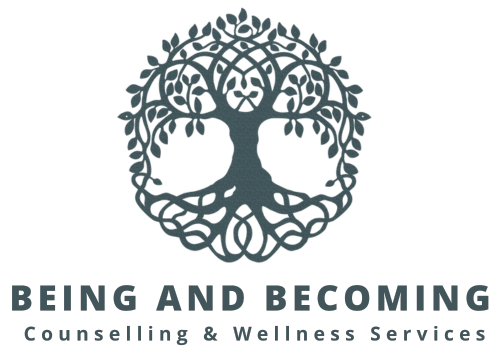BEING AND BECOMING COUNSELLING AND WELLNESS SERVICES
Binge Eating Therapy
Specialized support to help you overcome loss of control and regain a peaceful relationship with food.
Binge Eating Therapy Can Help You:
FEEL IN CONTROL OF YOUR EATING
DECREASE SHAME AND GUILT
TRUST YOURSELF AROUND FOOD
When you don’t trust yourself to stop eating.
Maybe you are able to feel in control of your eating for part, or even the majority of the day, but eventually you give into your cravings, lose control and feel unable to stop eating. You feel frustrated with yourself, ashamed, and confused about why this keeps happening. You may wonder if you will ever be able to eat “normally?”
Therapy can help you regain feelings of ease around food.
It is possible to break free from binge eating.
BINGE EATING THERAPY MAY HELP WHEN YOU:
Eat large amounts of food despite not feeling hungry
Eat until you are uncomfortably full
Find it hard to stop eating
Eat rapidly
Eat in secrecy
Hide what you eat from others
Feel confused about why you keep eating in this way and/or powerless to stop it
Experience feelings of shame, guilt or disgust about your eating
BINGE EATING THERAPY IN BURNABY
What is Binge Eating Therapy and How Does it Work?
Most of us eat to the point of physical discomfort at times. For some people, this experience becomes a regular part of their life and can bring with it feelings of frustration, shame, anxiety and regret.
Binge eating therapy provides a compassionate space to begin to explore and understand the complex feelings, sensations, thoughts, behaviours and experiences that may be fuelling your binge eating. By exploring and addressing these underlying issues, you can begin to take steps to help you feel in control of your eating, feel at ease around food and find other ways of coping with the stressors of daily life.
You don’t have to go through this alone.
Binge eating is very treatable and we are here to support you in your journey to recovery.
Modalities offered for Binge Eating Therapy
IN-PERSON COUNSELLING AVAILABLE IN BURNABY AND ONLINE COUNSELLING AVAILABLE ACROSS BC
-
Enhanced cognitive behaviour therapy (CBT-E) was developed specifically for treating eating disorders and has been shown to be effective in the treatment of binge eating disorder. CBT-E focuses primarily on making behavioural changes that decrease the likelihood of binge eating.
-
IFS therapy maintains that everyone has different parts (e.g., an inner critic, a perfectionist part, a procrastinator part) as well as a Self. Some parts carry trauma or painful emotions and other parts try to protect these wounded parts. Protector parts can get stuck in extreme roles that have adverse consequences. IFS aims to heal parts from the traumas they have experienced or the burdens they carry so that the system can come into balance and the individual can be more Self-led.Early research suggests IFS is as effective as other evidence-based approaches in the treatment of depression).
-
Compassion-focused therapy (CFT) helps to counteract that harsh self-judgment, self-criticism and shame that individuals who engage in binge eating often experience. Self-compassion has been shown to be helpful in the treatment of eating disorders. CFT emphasizes the cultivation of self-compassion and compassion for others.
-
Intuitive eating is an evidence-based approach that focuses on helping you meet both your biological and psychological needs by becoming attuned to your body and relearning to trust its signals. This approach focuses on moving away from rules, beliefs and thoughts that create obstacles to body attunement and body trust.
-
Somatic therapy is a body-based approach that works directIy with the body. Individuals who engage in binge eating are often disconnected from their bodies and the information their body is providing them. Somatic therapy helps individuals inhabit their bodies so that they can use their body as a resource; gain awareness of the information coming from the body and regain trust in this information so they can take effective action to get their needs met. Somatic therapy supports individuals to learn to be attuned to and responsive to their bodies, allowing them to effectively self-regulate so that they are not having to turn to food to cope.
-
Binge eating can be related to trauma. If this is the case for you, your therapist will use therapy modalities developed specifically to work through trauma (e.g., EMDR, sensorimotor psychotherapy). Read our trauma therapy page for more information.
-
Binge eating can often be a way of dealing with difficult emotions. Emotion-focused therapy (EFT) is a type of therapy that focuses on gaining and improving emotional awareness, regulation, acceptance, and expression in order to heal and facilitate powerful therapeutic change.
BINGE EATING THERAPY ACROSS BC
Counselling for Binge Eating
When seeking counselling for binge eating, your therapist will assess what is contributing to, and maintaining, your binge eating. This information will allow your therapist to develop a personalized treatment plan to help you overcome binge eating. The approach taken with each individual will vary, but counselling for binge eating may involve:
Helping you understand why you binge eat
Helping you break free from the restrict-binge cycle
Increasing your interoception skills (i.e., your ability to perceive sensations inside your body)
Supporting you to increase your capacity to notice and trust the feedback your body is providing about ways of eating that feel healthy, satisfying and nourishing
Teaching you additional ways to manage your emotions so that you are not having to rely on food
Helping you shift unhelpful internal dialogues and ways of relating to yourself that may be contributing to your eating challenges.
If you have a history of trauma, your therapist may
Help you recognize how binge eating was a survival strategy (and likely a very effective one) that helped you cope with what was going on using what resources you had available to you at the time
Help you understand and learn to regulate your nervous system
Help you increase awareness of your trauma responses (i.e., symptoms) and teach you resources, or help you access resources you already possess, to help you deal with these symptoms effectively.
Help you process past traumatic experiences
You can learn more about trauma therapy here
What You Can Expect To Get Out of Binge Eating Therapy
Each person’s journey to recovery from binge eating will be different, but in time you may notice that you:
Experience less distress or anxiety around eating
Feel more in control of your eating
Feel better able to recognize and respond to your hunger and fullness cues
Feel more able to be present when eating
Feel at ease around food
Experience greater pleasure when eating
Are no longer turning to food to cope with difficult situations or emotions
Have increased confidence in your ability to eat without losing control
Can eat previously feared or avoided foods without losing control
Experience less shame and are able to extend yourself more compassion
Therapists Offering Binge Eating Therapy
Commonly Asked Questions About Binge Eating
-
Binge eating is a complex behaviour, with several possible contributing factors. Here are some of the most common contributing factors:
Not fueling your body sufficiently
When you do not feed your body enough food, your body will take action to try to ensure you feed it more. For example your body will increase the intensity of cravings, make you preoccupied with thoughts of food, and delay feelings of fullness. These physiological responses are outside of your control and increase the likelihood you will lose control around food.
Having a history of food insecurity
Individuals with a history food insecurity (i.e., not having access to adequate food) are more susceptible to developing eating-related challenges, including binge eating.
Avoiding certain foods because you think they are “bad"
Depriving yourself of certain foods can make you more susceptible to losing control around these foods. When you experience a loss of freedom, even if it is self-imposed, this can lead to a phenomenon called “psychological reactance.” With psy psychological reactance you feel strongly motivated to rebel against the rule that you avoid a certain food. You may also experience the “what the hell” effect — eating as much as you can of a certain food because you think you have “already blown it” and plan to resume avoiding the food again tomorrow.
Having difficulty coping with your emotions
Eating is one of the earliest forms of comfort we experience as human beings. While binge eating often results in increased distress by contributing to feelings of shame, guilt, depression or disgust, it is very effective at providing comfort in the moment, distracting you from what you may be feeling, or helping you numb your feelings. This immediate benefit of binge eating is very reinforcing and increases the likelihood you will binge eat again when you are experiencing difficult emotions.
-
Many individuals (NOT ALL) who struggle with binge eating also have a history of trauma. Trauma can cause distressing thoughts and feelings and people who have experienced trauma often turn to behaviours that help them cope with their trauma symptoms. Eating can be one of these behaviours that helps individuals cope. Eating may be a means to distract from difficult thoughts or emotions, to comfort and soothe oneself, or to numb painful emotions.
Individuals with a history of trauma also often become disconnected from their bodies as a result of the trauma, making them more susceptible to developing eating issues. It is hard to honour your hunger and fullness signals when you can’t feel your body.
If you have a history of trauma and are struggling with binge eating, it is important to find a therapist who has specialized training in both areas.










